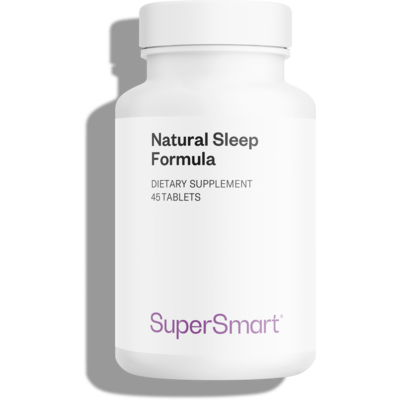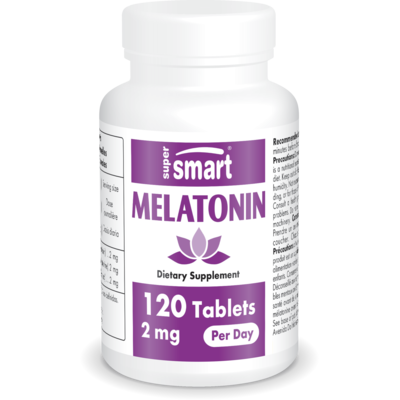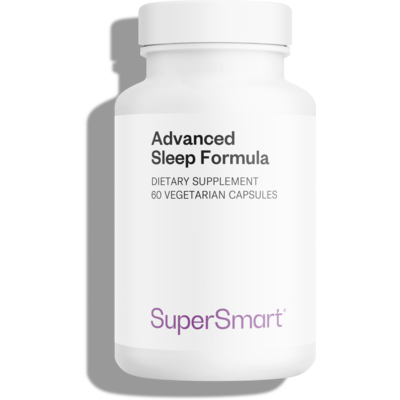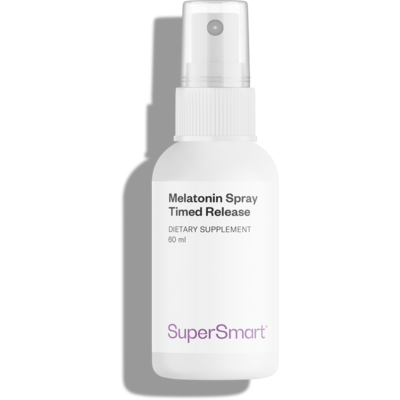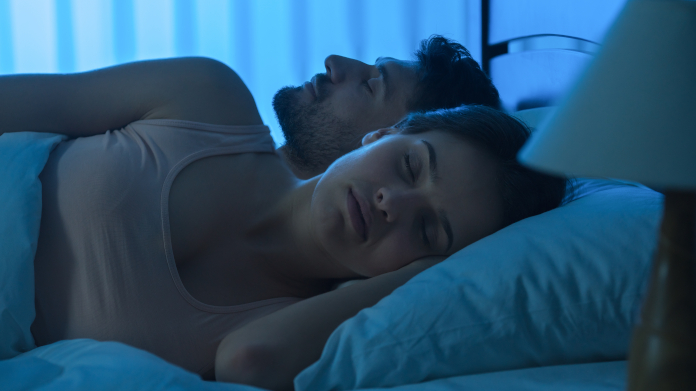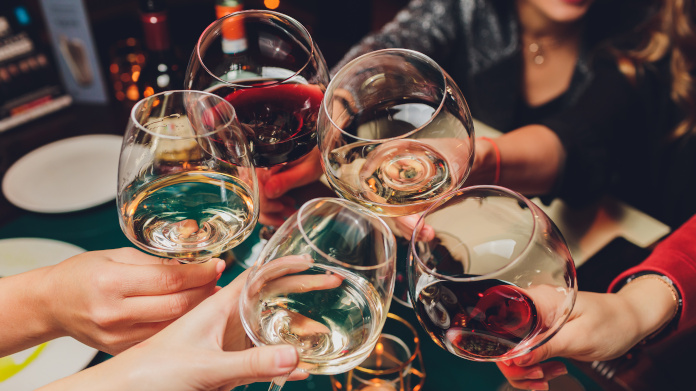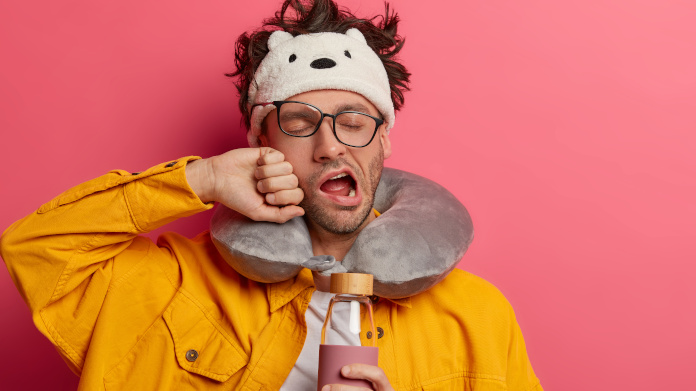How to have a restful night’s sleep
Getting up in the morning without dragging your heels might seem like a dream but it’s totally achievable. Here’s our advice for rediscovering a restful night’s sleep and starting the day on the right foot.
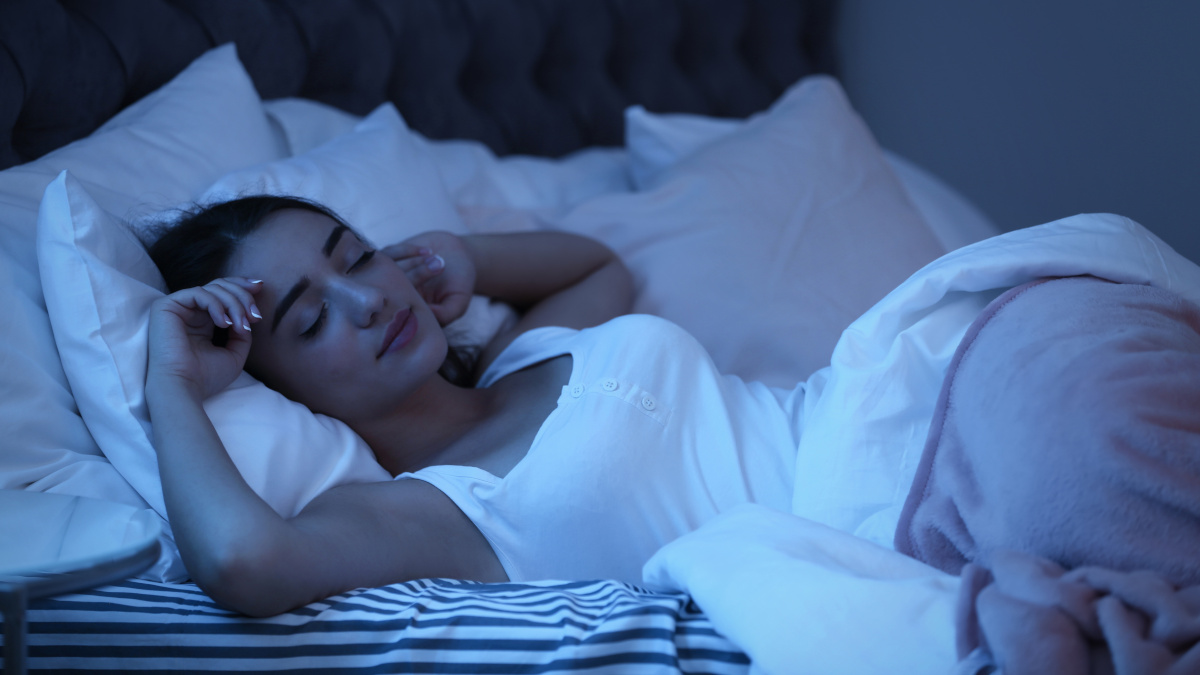
Restful sleep: definition
Restful sleep can be defined as good quality sleep that makes you feel sufficiently well-rested and ready for the day ahead, as soon as you wake up.
How well you sleep at night is intrinsically linked to sleep structure or architecture. This is divided into four or six sleep cycles of around 90 minutes, each of which consists of three stages: light sleep, deep sleep and REM sleep (1).
It’s during the deep sleep stage, when the brain is least active, that the body fully recovers from accumulated fatigue. This represents 20%-25% of total sleep and occurs predominantly during the first half of the night (2).
If this stage is missed, or it’s too short, we’re likely to feel knocked for six by signs of fatigue from the moment we get up: struggling to keep our eyes open, yawning repeatedly, stiffness, brain fog …
What are the benefits of restorative sleep?
Restorative sleep is essential for good general health. It’s associated with a lower risk of cardiovascular disease, stronger immunity, and a balanced nervous system, and it boosts our memorisation and learning abilities (3).
How much restorative sleep is enough?
It’s estimated that adults need an average of 7 to 9 hours’ sleep a night to restore physical and mental abilities (4). However, individual needs vary widely: some people will need longer, while others recover more quickly. More than the duration, it’s actually the quality of sleep which is important.
How to have good quality sleep
Improving your sleep naturally is perfectly possible, as long as you’re prepared to embrace a healthy lifestyle (and adopt some new habits):
- go to bed at a regular time to resynchronise your biological clock;
- ban all sources of blue light after 8pm such as tablets, computers and smartphones, as they stimulate the nervous system and make it harder to fall asleep by inhibiting the release of melatonin, the famous ‘sleep hormone’ (5);
- eat lightly at dinner to facilitate digestion, preferably leaving a gap of three hours before you go to bed (6);
- avoid stimulants such as tea, coffee, alcohol and nicotine, as well as high-dose vitamin C supplements in the evening (7);
- take some exercise during the day to stabilise circadian rhythms, eliminate stress and promote synthesis of the ‘well-being’ neurotransmitters (endorphins, serotonin, dopamine) (8);
- keep your bedroom cool (around 16°C) in order to lower your body temperature more quickly and shorten the time it takes to fall asleep;
- block out noise and light as much as possible to create an environment conducive to sleep: if it’s impossible to eliminate every such disturbance, wear earplugs or an eye mask (9);
- invest in good quality bedding: for info, you should theoretically change your mattress every ten years (10).
If, despite trying all these measures, your sleep issues persist, consult your doctor to make sure they are not caused by a more serious problem (such as sleep apnoea) (11).
Sleep before midnight is the most restorative: myth or fact?
It’s often said that an hour of sleep before midnight is worth two after. There is some truth in this … and yet.
While we do have more hours of deep sleep at the beginning of the night, this doesn’t depend on what time we go to bed: whether we retire for the night at 10pm or 3am, our first sleep cycle will follow the same pattern.
However, that doesn’t take account of our internal body clock, which is pretty accurate at counting how much time we have left to spend in bed. When we go to bed very late, but are still going to be waking up before too long, it confuses our biological clock ... prompting it to cut back on our deep sleep time.
For the best possible regenerative sleep, following our individual biological clock appears to be better than forcing one on it, even though several studies suggest morning chronotypes (who go to bed early and get up early) have a certain advantage over ‘Night Owls’ (12). Whichever you are, it’s best to give yourself a sufficiently long rest period - compatible with your social demands - to enable you to wake up firing on all cylinders.
What can you do when you just can’t get to sleep?
Do you find it difficult to nod off at night? Difficulty falling asleep is part of the classic picture of insomnia, which is thought to affect more than 10% of Europeans. Before reaching for medication (such as sleeping pills), it’s worth trying some natural approaches.
The first step is to establish a sleep routine. This doesn’t just mean going to bed at a set time (including at the weekend), but also initiating a bedtime ritual – for example, drinking a herbal tea or reading a good book (13). By repeating these little steps, you’re gently conditioning and preparing your body (and mind) for sleep.
Note too that failing to properly manage stress and anxiety keeps the body in a state of hypervigilance, unconducive to entering the light sleep stage (14). Practising meditation, breathing exercises or Yoga Nidra (‘yogic sleep’) at bedtime can help you release any tension and fully relax (15).
If you find yourself tossing and turning in bed, engage in visualisation exercises such as a mental walk: in your head, recreate a favorite walk, focusing on every detail : the path, the trees, the birds ... not only will it stop you ruminating, but you’ll develop a sense of security that will help you fall asleep.
Rediscovering restful sleep naturally: key plants and supplements
Produced by the pineal gland in the brain in response to increasing darkness, melatonin plays a central role in controlling the sleep-wake cycle. When circadian rhythms are disrupted (by jetlag, late bedtimes, shift work...), supplementation with melatonin (available in tablet form in Melatonin 1 mg, or super-convenient spray form in Melatonin Spray) can help reduce the time it takes to fall asleep (16).
Certain plants can also help you sleep more soundly. One such plant is valerian, the roots of which help to maintain good quality sleep (17). Combining it with relaxing plants such as hop, which supports the nervous system through the calming action of its constituents humulone and lupulone, has also been shown to be effective in numerous studies (these two plant extracts feature in the excellent formulation Natural Sleep Formula, which also includes California poppy, rhodiola and tryptophan) (18-19).
In other products, these two plants are combined with melatonin for an enhanced action (one such supplement is Advanced Sleep Formula, an exceptional synergistic formulation featuring valerian, hawthorn, passiflora, hop and melatonin, and also rich in vitamin B6 which helps reduce fatigue) (20).
SuperSmart ADVICE
References
- Patel AK, Reddy V, Shumway KR, et al. Physiology, Sleep Stages. [Updated 2022 Sep 7]. In: StatPearls [Internet]. Treasure Island (FL): StatPearls Publishing; 2023 Jan-. Available from: https://www.ncbi.nlm.nih.gov/books/NBK526132/
- Purves D, Augustine GJ, Fitzpatrick D, et al., editors. Neuroscience. 2nd edition. Sunderland (MA): Sinauer Associates; 2001. Stages of Sleep. Available from: https://www.ncbi.nlm.nih.gov/books/NBK10996/
- Worley SL. The Extraordinary Importance of Sleep: The Detrimental Effects of Inadequate Sleep on Health and Public Safety Drive an Explosion of Sleep Research. P T. 2018 Dec;43(12):758-763. PMID: 30559589; PMCID: PMC6281147.
- Hirshkowitz M, Whiton K, Albert SM, Alessi C, Bruni O, DonCarlos L, Hazen N, Herman J, Katz ES, Kheirandish-Gozal L, Neubauer DN, O'Donnell AE, Ohayon M, Peever J, Rawding R, Sachdeva RC, Setters B, Vitiello MV, Ware JC, Adams Hillard PJ. National Sleep Foundation's sleep time duration recommendations: methodology and results summary. Sleep Health. 2015 Mar;1(1):40-43. doi: 10.1016/j.sleh.2014.12.010. Epub 2015 Jan 8. PMID: 29073412.
- Tähkämö L, Partonen T, Pesonen AK. Systematic review of light exposure impact on human circadian rhythm. Chronobiol Int. 2019 Feb;36(2):151-170. doi: 10.1080/07420528.2018.1527773. Epub 2018 Oct 12. PMID: 30311830.
- Chung N, Bin YS, Cistulli PA, Chow CM. Does the Proximity of Meals to Bedtime Influence the Sleep of Young Adults? A Cross-Sectional Survey of University Students. Int J Environ Res Public Health. 2020 Apr 14;17(8):2677. doi: 10.3390/ijerph17082677. PMID: 32295235; PMCID: PMC7215804.
- Ogeil RP, Phillips JG. Commonly used stimulants: Sleep problems, dependence and psychological distress. Drug Alcohol Depend. 2015 Aug 1;153:145-51. doi: 10.1016/j.drugalcdep.2015.05.036. Epub 2015 May 28. PMID: 26049205.
- Banno M, Harada Y, Taniguchi M, Tobita R, Tsujimoto H, Tsujimoto Y, Kataoka Y, Noda A. Exercise can improve sleep quality: a systematic review and meta-analysis. 2018 Jul 11;6:e5172. doi: 10.7717/peerj.5172. PMID: 30018855; PMCID: PMC6045928.
- Halperin D. Environmental noise and sleep disturbances: A threat to health? Sleep Sci. 2014 Dec;7(4):209-12. doi: 10.1016/j.slsci.2014.11.003. Epub 2014 Nov 15. PMID: 26483931; PMCID: PMC4608916.
- Shen L, Chen YX, Guo Y, Zhong S, Fang F, Zhao J, Hu TY. Research on the relationship between the structural properties of bedding layer in spring mattress and sleep quality. 2012;41 Suppl 1:1268-73. doi: 10.3233/WOR-2012-0312-1268. PMID: 22316893.
- Cumpston E, Chen P. Sleep Apnea Syndrome. [Updated 2022 Nov 3]. In: StatPearls [Internet]. Treasure Island (FL): StatPearls Publishing; 2023 Jan-. Available from: https://www.ncbi.nlm.nih.gov/books/NBK564431/
- Olds TS, Maher CA, Matricciani L. Sleep duration or bedtime? Exploring the relationship between sleep habits and weight status and activity patterns. 2011 Oct 1;34(10):1299-307. doi: 10.5665/SLEEP.1266. PMID: 21966061; PMCID: PMC3174832.
- Finucane E, O'Brien A, Treweek S, Newell J, Das K, Chapman S, Wicks P, Galvin S, Healy P, Biesty L, Gillies K, Noel-Storr A, Gardner H, O'Reilly MF, Devane D. Does reading a book in bed make a difference to sleep in comparison to not reading a book in bed? The People's Trial-an online, pragmatic, randomised trial. Trials. 2021 Dec 4;22(1):873. doi: 10.1186/s13063-021-05831-3. PMID: 34996514; PMCID: PMC8740874.
- Kalmbach DA, Anderson JR, Drake CL. The impact of stress on sleep: Pathogenic sleep reactivity as a vulnerability to insomnia and circadian disorders. J Sleep Res. 2018 Dec;27(6):e12710. doi: 10.1111/jsr.12710. Epub 2018 May 24. PMID: 29797753; PMCID: PMC7045300.
- Sharpe E, Tibbitts D, Wolfe B, Senders A, Bradley R. Qualitative Impressions of a Yoga Nidra Practice for Insomnia: An Exploratory Mixed-Methods Design. J Altern Complement Med. 2021 Oct;27(10):884-892. doi: 10.1089/acm.2021.0125. Epub 2021 Jul 15. PMID: 34265219.
- Costello RB, Lentino CV, Boyd CC, O'Connell ML, Crawford CC, Sprengel ML, Deuster PA. The effectiveness of melatonin for promoting healthy sleep: a rapid evidence assessment of the literature. Nutr J. 2014 Nov 7;13:106. doi: 10.1186/1475-2891-13-106. PMID: 25380732; PMCID: PMC4273450.
- Bent S, Padula A, Moore D, Patterson M, Mehling W. Valerian for sleep: a systematic review and meta-analysis. Am J Med. 2006 Dec;119(12):1005-12. doi: 10.1016/j.amjmed.2006.02.026. PMID: 17145239; PMCID: PMC4394901.
- Palmieri G, Contaldi P, Fogliame G. Evaluation of effectiveness and safety of a herbal compound in primary insomnia symptoms and sleep disturbances not related to medical or psychiatric causes. Nat Sci Sleep. 2017 May 26;9:163-169. doi: 10.2147/NSS.S117770. PMID: 28603433; PMCID: PMC5457154.
- Salter S, Brownie S. Treating primary insomnia - the efficacy of valerian and hops. Aust Fam Physician. 2010 Jun;39(6):433-7. PMID: 20628685.
- Noah L, Dye L, Bois De Fer B, Mazur A, Pickering G, Pouteau E. Effect of magnesium and vitamin B6 supplementation on mental health and quality of life in stressed healthy adults: Post-hoc analysis of a randomised controlled trial. Stress Health. 2021 Dec;37(5):1000-1009. doi: 10.1002/smi.3051. Epub 2021 May 6. PMID: 33864354; PMCID: PMC9292249.
Keywords
1 Days
The new packaging is excellent
The new packaging is excellent - finally! No more squashed boxes and torn envelopes.
GORAN
2 Days
Great Product
Great Product
Larry Garrett
6 Days
Quick shipping
Quick shipping; good price. No issues!
Mary McCarty
8 Days
Thr product is very good and is helping…
Thr product is very good and is helping me on my health. Then is always on time
LUGO Luz
10 Days
Buying was fine
Buying was fine. I had problems with the website not recognizing my login info, and had to call to get it fixed. Other than that, everything was good.
David S. Clark
10 Days
Your super maca and super ginseng are…phenomenal
Your super maca and super ginseng are phenomenal supplements that compliment each other when taking them together. Fantastic feeling of well-being and lots of mid day energy without the crash.
Keith Mason
13 Days
I have had amazing results with every…
I have had amazing results with every supplement I've purchased. I am extremely satisfied with this company
kirstin Torres
13 Days
Fine products
Fine products . They are on the leading edge of online supplements. The only issue -so far-is they sometime run out of subscription items.
Jason Argos
16 Days
The ordering process is very user…
The ordering process is very user friendly and the products always come in a timely manner.
CARTER Rhonda
17 Days
The price for Dr
The price for Dr. Pero's AC-11 is reasonable and in line with his views. (my former colleague). Keep it pure.
CAMPBELL Clayton
20 Days
Right on every time.
Right on every time.
Arthur Nicholas
22 Days
They are cheaper than everyone else and…
They are cheaper than everyone else and the shipping was fast. Great company.
Patricia Adams
29 Days
Availability of quality health…
Availability of quality health supplements and it's wide variety is impressive. Ordering is seamless and shipping even during the holidays is well streamlined.
Mohamad Hussein
43 Days
A Product worth waiting for when not…
A Product worth waiting for when not available and then arriving as a surprise!
DOMINIC
45 Days
On time shipping
On time shipping
GEORGE Verne


